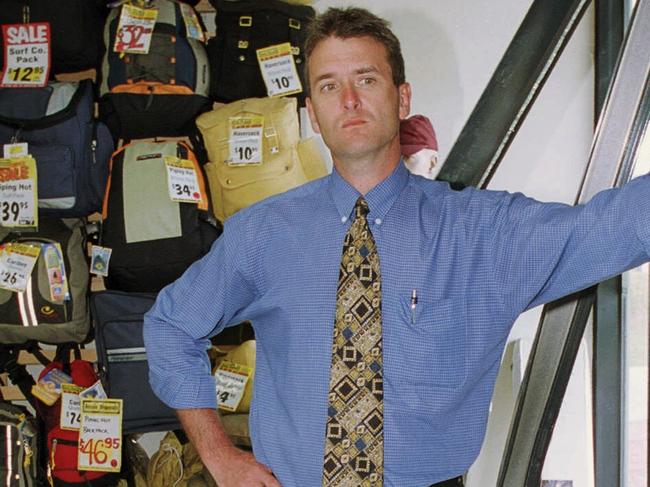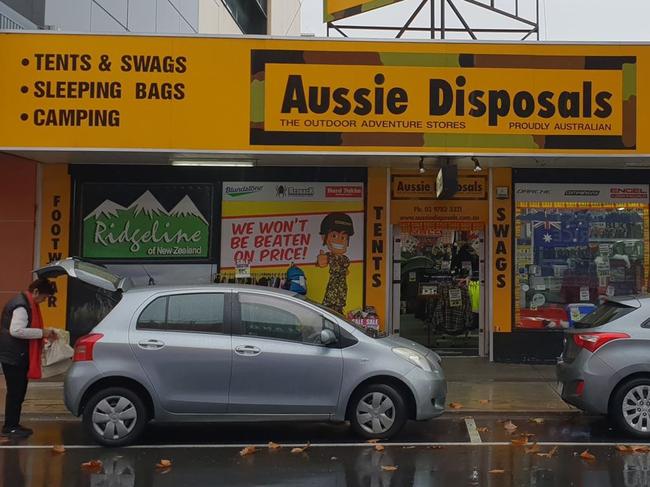Aussie Disposals in voluntary administration and says online is way of the future
Camping chain Aussie Disposals will close 11 of its 36 stores after going into voluntary administration and its boss says the public shift to online shopping is here to stay.
Business
Don't miss out on the headlines from Business. Followed categories will be added to My News.
The owner of struggling camping chain Aussie Disposals says the coronavirus lockdown will fuel a permanent shift to online shopping, and retail stores in shopping centres will be hardest hit by it.
The warning came as the 58-year-old retail chain placed itself into voluntary administration as part of a restructure which will result in close to one in three stores closing.
The move to shrink the chain’s bricks-and-mortar footprint comes amid the coronavirus lockdown and follows the retailer being battered by the drought, bushfires and the shift to online shopping.
Aussie Disposals owner and managing director Mark Purvis said he was confident the business would survive but the retail landscape would not be the same when the coronavirus lockdown was lifted.
“With coronavirus everyone is doing everything online and it is going to change their ways of shopping and buying,” he told Business Daily.

“People will go back to the shops — there is no doubt about that — but it won’t be to anywhere near the levels it used to be.”
The Melbourne-based outdoor and camping goods retailer was founded in 1962 by Mark’s father, Bill Purvis, and operates 36 stores across Victoria, New South Wales and South Australia.
It is now working to close at least 11 outlets.
The retailer, which sells camping furniture, fishing supply and snow gear, as well as military surplus products, employs about 120 staff.
It expects to shed more than 20 jobs.
“We certainly have a strong focus to continue on,” Mr Purvis said.
“Unfortunately we will see some people become redundant through this and no business owner likes to see that.”
Mr Purvis said the business had closed stores in the past couple of years as consumers shifted to online shopping.
Outlets on retail strips were doing far better than those housed in major shopping centres, he said.

“Shopping centres aren’t what they used to be — a lot of young people don’t go to shopping centres anymore,” he said.
Mr Purvis said the business had, to date, been well supported by its bank, ANZ.
Regional and retail-strip landlords were being supportive of efforts to restructure the business but major shopping centres were yet to offer much support, he said. “A lot of country landlords that we deal with have been very good, some of the strip-shop landlords are very good but shopping centres have been quite the opposite,” Mr Purvis said.
Magnetic Insolvency is handling the administration.
A string of retailers has collapsed in the past six months including homewares store Ishka, department store Harris Scarfe, and fashion retailers Jeanswest and Colette by Colette Hayman.
The upheaval at Aussie Disposals came as the Westpac-Melbourne Institute consumer confidence index posted its biggest fall in its 47-year history during April.
The index fell 18 per cent to 75.6 in April, from 91.9 in March.
This took confidence down to levels last seen during the recession of the early 1990s.
Westpac chief economist Bill Evans said the read was “very disturbing”, particularly given the speed of the downfall.
“The lows in previous recessions were reached after one to two years of continuous deterioration compared to the one-month collapse we have seen here,” he said.
The survey polled 1200 adults from April 6 to 11.
